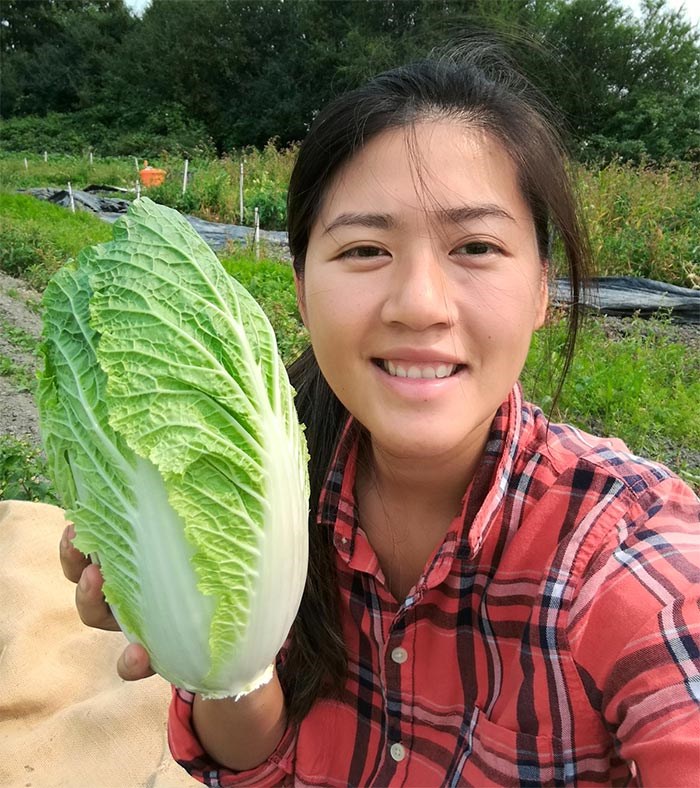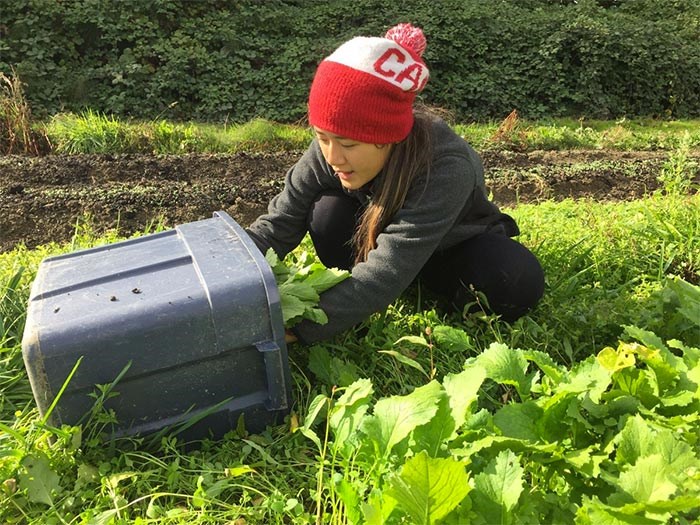When Caroline Chiu moved with her family from Hong Kong to Richmond 14 years ago, she noticed that many popular Chinese vegetables she used to have in Hong Kong were not easy to find here.
So when the 28-year-old Richmondite built her half-acre farm — Riverside Farm at 13840 Gilbert Rd, she had one goal in mind: to introduce organic Chinese greens to the Canadian public.
“I feel very privileged to be exposed to two different cultures,” said Chiu.
“I think it’s beautiful to bridge that gap, to introduce more ethnic Chinese greens to farmers’ markets which are still dominated by Western food.”
Chiu was employed as an agricultural researcher for Kwantlen Polytechnic University (KPU) in 2013 after receiving her master’s degree in food and resource economics from UBC.
During that time, she became interested in KPU’s farming program and got enrolled as a student in 2015.
“At first, I only joined the farming program to better understand agriculture and advance my career,” said Chiu.
“Then I couldn’t stop. I have learned farming, now I want to do farming...I found myself really enjoying it.”
 Chiu hopes more young people in Richmond will get involved in local agriculture. Photo submitted
Chiu hopes more young people in Richmond will get involved in local agriculture. Photo submitted
She and a friend leased 22,000 sq. ft. of farmland from KPU, which leases land to farm graduates at an affordable rate.
Chiu grows more than 20 types of organic vegetables, including various Chinese greens such as bok choy, gai lan, yu choy, choi sum and pettus — vegetables an Asian family would have on a daily basis.
“I’m not gonna lie, working in the field is very tiring and stressful, mentally and physically,” said Chiu.
She said things change so fast in farming, and a couple of hours of strong wind can break the greenhouse and damage the plants.
“But it’s very fulfilling at the same time, especially when my vegetables change someone’s eating habits, when they share their food with other people, or when they come back to me to buy again,” Chiu said.
She enjoys introducing Chinese greens to people who have never tried them before, and introducing Chinese customers to other vegetables they have never seen.
She noted that although Asian vegetables are sold in many supermarkets in Richmond, organic Asian greens are still rare.
“I had some Chinese customers coming to me, although they didn’t buy a lot, they wanted to know more about organic food,” said Chiu.
“I would explain the benefits of organic veggies and why they are more expensive than the ones in the supermarket. It’s such a valuable experience to educate them about this.”
Chiu managed to sell all her vegetables this year through Community Supported Agriculture (CSA), a program in which members pay up front at the beginning of the season to receive a $20 box of assorted vegetables every week, for about four months.
“We like that model because our income is guaranteed. It’s a good way to support us farmers,” said Chiu.
“It’s also a lifestyle choice for customers because they are forced to try different vegetables, and have to get creative with their cooking with the veggies they received,” she added.
 Chiu said working in the field can be tiring and stressful, but also very fulfilling. Photo submitted.
Chiu said working in the field can be tiring and stressful, but also very fulfilling. Photo submitted.
Chiu grew up in a family where no one worked in agriculture. Her being a farmer was never something her parents expected.
“I live in a typical Chinese family. My parents want me to be a professional, like a doctor, but I don’t want to do that,” Chiu said.
“They think, ‘you have a master’s degree, why are you farming? It’s a lot of hard work and you don’t make much money.’ That’s really odd to them,” she laughed.
But the organic veggies she grows are changing her family’s attitude towards her job.
“They realised how much tastier the food is when I brought home the veggies from my farm, and they have started to appreciate local organic vegetables.”
Now Chiu is working as the manager for the KPU farming program as well as running her own farm. She hopes her experience will encourage more young people in Richmond to get involved in local agriculture.
“The local organic food movement is still pretty slow in Richmond. Farmers’ markets are going to take time to build,” said Chiu.
“I think each region, city or country should have the ability to grow their own food. It makes us more resilient to international change as food is a basic necessity.”


